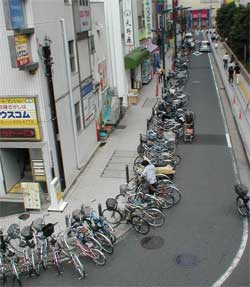Spring into Gear has cyclists pumped for warm weather

Cindy Dayton took this photo while on vacation in Tokyo in the fall of 2004. It was one of many photos on display on the Hall Building mezzanine during the bike-friendly Spring into Gear Fair on April 11.
Concordians were invited to Spring Into Gear on April 11 with a series of events devoted to promoting bikes as a viable means of transportation.
“Bikes are ecological, healthy and cheap,” according to (Bicycle) Bob Silverman, longtime two-wheel advocate and one of the founders of le Monde à Bicyclette. The organization was extremely visible in the ’70s and ’80s and helped define Montreal as a bike-friendly city.
Silverman was one of four speakers at the evening panel discussion co-sponsored by Sustainable Concordia and the Montreal chapter of Planners Network, a group of academics and activists devoted to responsible urban planning.
The discussion capped off the day-long fair held on the Hall Building mezzanine and the terrace behind it. Organizations, including Sustainable Concordia’s Allégo project, Free Wheels and Vélogik — which both offer bicycles to people who contribute time to their operations — and Équiterre all had information on making bicycling safer, especially in the downtown core.
Many also had petitions demanding measures to support that goal.
Members of Colors of Concordia were also present, encouraging people to participate in the upcoming Tour de l’Ile to raise money for their endowment. It will provide an award for a student whose volunteer work promotes intercultural understanding.
The People’s Potato served food to those who visited the terrace. A carnival atmosphere was provided by members of Right to Move and the Broken Spokes Bike Club.
Tony Alfonso explained that Broken Spokes promotes cycling — and he did it while constructing a two-storey bicycle, a tandem bicycle and other souped-up forms of transportation that members rode through the crowd.
Alfonso and his allies offered workshops throughout the day on bike maintenance and defensive urban cycling.
By evening, a steady stream of people were filing into H-110, helmets tucked under their arms, to hear the panelists address the “Politics of the Bicycle.”
In addition to Silverman, Project Montreal leader Richard Bergeron addressed his municipal party’s plans for a less car-congested city. Marc Jolicoeur, spokesperson for Vélo-Québec, discussed proposed improvements to the city’s network of bicycle paths, particularly the need for east-west links across the city.
Jolicoeur noted that 3,000 cyclists use Milton Ave. every day. A bicycle lane along de Maisonneuve Blvd. would ease congestion.
Recently elected Mile End city councillor, Michel Labrecque, talked about his decades of bike activism and his decision to run for municipal office “to find out why it’s so hard to get bike lanes. Some people want to change the world, I just want a few more stop signs.”
Labrecque and Silverman reminisced about their protracted battles for cyclists over the years. Their victories include access to the metro at off-peak hours and bike lanes on bridges from off the island.
The panelists produced facts to buttress their arguments. Bergeron celebrated the downtown regions of European cities like Munich and Strasbourg, which have kept cars out of city centres in favour of tramways and other less polluting forms of public transit.
He added that many of these vehicles are produced by Bombardier, which is based here.
Urban Studies Professor Craig Townsend is a member of Allégo and the Planners Network who teaches a course on urban transit. He pointed out that for many, “cycling is not just a means of transportation, but a challenge to auto-dependent cities and consumerism.”
